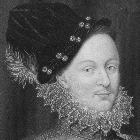Edward de Vere
Edward de Vere Poems
Sitting alone upon my thought in melancholy mood,
In sight of sea, and at my back an ancient hoary wood,
...
Faction, that ever dwells in Courte where witt excels,
Hath sett defiance;
Fortune and Love have sworne that they were never borne
...
Come hither shepherd's swayne:
'Sir, what do you require?'
I praye thee, shewe to me thy name.
'My name is Fond Desire.'
...
Edward de Vere Biography
Edward de Vere, 17th Earl of Oxford (12 April 1550 – 24 June 1604) was an Elizabethan courtier, playwright, poet, sportsman, patron of numerous writers, and sponsor of at least two acting companies, Oxford's Men and Oxford's Boys, and a company of musicians. He was born at Castle Hedingham to the 16th Earl of Oxford and the former Margery Golding. Oxford was one of the leading patrons of the Elizabethan age and, during his lifetime, 33 works were dedicated to the Earl, including publications on religion, philosophy, medicine and music. The focus of his patronage, however, was literary, with 13 of the books presented to him either original or translated works of world literature. Authors dedicating their works to de Vere include Edmund Spenser, Arthur Golding, John Lyly, Anthony Munday, and Thomas Churchyard, the latter three writers all having been employed by de Vere for various periods of time. He also patronized musicians, including the composers William Byrd and John Farmer. His extensive patronage, as well as possible mismanagement of his estates, forced the sale of his ancestral lands. In 1586, Queen Elizabeth I granted the Earl an annuity of £1,000. De Vere was awarded military commands in 1585 in Flanders and in 1588 during the Spanish Armada. Oxford is today most well known as the strongest alternative candidate proposed for the authorship of Shakespeare's plays, a claim that most historians and literary scholars reject but which is supported by a number of researchers and theatre practitioners. For further information on this topic, see Oxfordian theory.)
The Best Poem Of Edward de Vere
Echo Verses.
Sitting alone upon my thought in melancholy mood,
In sight of sea, and at my back an ancient hoary wood,
I saw a fair young lady come, her secret fears to wail,
Clad all in colour of a nun, and covered with a veil;
Yet (for the day was calm and clear) I might discern her face,
As one might see a damask rose hid under crystal glass.
Three times, with her soft hand, full hard on her left side she knocks,
And sigh'd so sore as might have mov'd some pity in the rocks;
From sighs and shedding amber tears into sweet song she brake,
When thus the echo answered her to every word she spake:
Oh heavens ! who was the first that bred in me this fever ? Vere (Ver.)
Who was the first that gave the wound whose fear I wear for ever ? Vere.
What tyrant, Cupid, to my harm usurps thy golden quiver ? Vere.
What sight first caught this heart and can from bondage it deliver ? Vere.
Yet who doth most adore this sight, oh hollow caves tell true ? You.
What nymph deserves his liking best, yet doth in sorrow rue ? You.
What makes him not reward good will with some reward or ruth ? Youth.
What makes him show besides his birth, such pride and such untruth ? Youth.
May I his favour match with love, if he my love will try? Ay.
May I requite his birth with faith ? Then faithful will I die ? Ay.
And I, that knew this lady well,
Said, Lord how great a miracle,
To her how Echo told the truth,
As true as Phoebus' oracle.
Edward de Vere Comments
Edward de Vere Quotes
Were I a king, I could command content; Were I obscure, hidden should be my cares;
A doubtful choice, of these three which to crave, A kingdom, or a cottage, or a grave.

This is his best poem? There's no way this dude wrote Shakespeare.